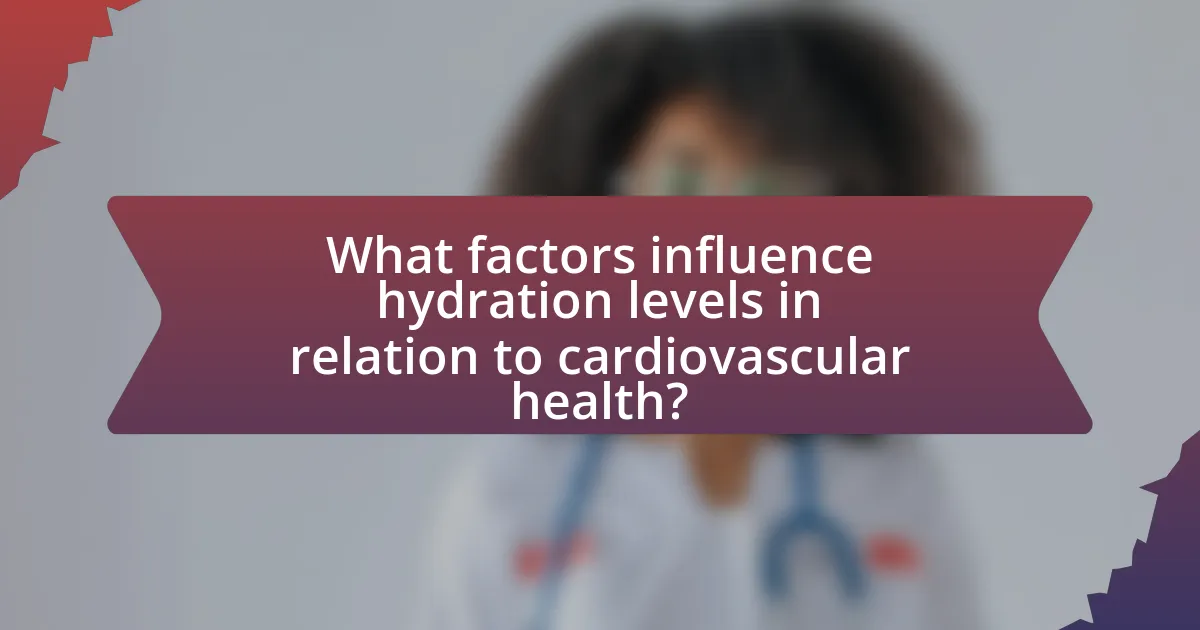Hydration is a critical factor in maintaining cardiovascular health, as it influences blood volume, viscosity, and overall heart function. Adequate fluid intake is essential for efficient circulation, reducing the risk of cardiovascular diseases such as hypertension and heart attacks. The article explores how hydration impacts heart function, blood pressure regulation, and various physiological processes within the cardiovascular system. It also examines the consequences of dehydration, factors affecting hydration levels, and best practices for maintaining optimal hydration to support heart health. Understanding these elements is vital for preventing cardiovascular complications and promoting overall well-being.

What is the role of hydration in cardiovascular health?
Hydration plays a crucial role in cardiovascular health by maintaining optimal blood volume and viscosity, which are essential for effective circulation. Adequate hydration ensures that the heart can pump blood efficiently, reducing the risk of cardiovascular diseases. Studies have shown that dehydration can lead to increased heart rate and decreased blood pressure, which can strain the cardiovascular system. For instance, research published in the Journal of the American College of Cardiology indicates that even mild dehydration can negatively impact heart function and increase the risk of heart-related issues. Therefore, maintaining proper hydration is vital for supporting cardiovascular health and preventing complications.
How does hydration impact heart function?
Hydration significantly impacts heart function by maintaining optimal blood volume and viscosity. Adequate hydration ensures that the heart can pump blood efficiently, which is crucial for delivering oxygen and nutrients to tissues. Dehydration can lead to increased heart rate and reduced stroke volume, putting additional strain on the cardiovascular system. Studies indicate that even mild dehydration can impair cardiovascular performance, as evidenced by research published in the Journal of the American College of Cardiology, which found that dehydration can elevate heart rate and decrease cardiac output. Thus, proper hydration is essential for maintaining effective heart function and overall cardiovascular health.
What physiological processes are influenced by hydration in the cardiovascular system?
Hydration significantly influences several physiological processes in the cardiovascular system, including blood volume regulation, cardiac output, and vascular function. Adequate hydration maintains optimal blood volume, which is crucial for effective circulation and nutrient delivery to tissues. When hydration levels are sufficient, the heart can pump blood more efficiently, increasing cardiac output and ensuring that organs receive adequate oxygen and nutrients. Furthermore, hydration affects vascular function by promoting endothelial health, which is essential for maintaining vascular tone and preventing hypertension. Studies have shown that dehydration can lead to increased blood viscosity and elevated heart rate, both of which can strain the cardiovascular system and increase the risk of cardiovascular events.
How does hydration affect blood pressure regulation?
Hydration significantly affects blood pressure regulation by influencing blood volume and vascular resistance. Adequate hydration increases blood volume, which can lead to higher blood pressure, while dehydration reduces blood volume, potentially causing lower blood pressure. Studies indicate that even mild dehydration can result in a decrease in blood pressure due to reduced plasma volume and increased blood viscosity. For instance, research published in the American Journal of Hypertension found that individuals with lower hydration levels exhibited higher rates of orthostatic hypotension, demonstrating the direct link between hydration status and blood pressure regulation.
Why is hydration important for overall cardiovascular health?
Hydration is crucial for overall cardiovascular health because it helps maintain optimal blood volume and circulation. Adequate fluid intake ensures that the heart can pump blood efficiently, delivering oxygen and nutrients to tissues while removing waste products. Studies indicate that dehydration can lead to increased blood viscosity, which raises the risk of cardiovascular events such as heart attacks and strokes. For instance, research published in the Journal of the American College of Cardiology found that even mild dehydration can negatively impact heart function and increase the workload on the heart. Thus, maintaining proper hydration is essential for supporting cardiovascular efficiency and reducing health risks.
What are the consequences of dehydration on heart health?
Dehydration negatively impacts heart health by increasing heart rate and reducing blood volume. When the body is dehydrated, the heart must work harder to pump blood, leading to elevated heart rates and potential strain on the cardiovascular system. Studies indicate that even mild dehydration can cause a significant increase in heart rate, which can elevate the risk of cardiovascular events. Additionally, dehydration can lead to thicker blood, increasing the risk of clot formation and potentially resulting in heart attacks or strokes.
How does adequate hydration contribute to cardiovascular disease prevention?
Adequate hydration significantly contributes to cardiovascular disease prevention by maintaining optimal blood viscosity and promoting efficient circulation. When the body is well-hydrated, blood volume is sufficient, which helps to lower the risk of hypertension and reduces the strain on the heart. Research indicates that dehydration can lead to increased blood viscosity, which is associated with a higher risk of thrombus formation and cardiovascular events. Furthermore, proper hydration supports the regulation of blood pressure and aids in the transportation of nutrients and oxygen to the heart and other vital organs, thereby enhancing overall cardiovascular function.

What factors influence hydration levels in relation to cardiovascular health?
Hydration levels significantly influence cardiovascular health through factors such as fluid intake, environmental conditions, physical activity, and individual health status. Adequate fluid intake is essential for maintaining blood volume and viscosity, which directly affects heart function and blood pressure regulation. Environmental conditions, such as temperature and humidity, can increase fluid loss through perspiration, necessitating higher hydration to maintain cardiovascular efficiency. Physical activity elevates fluid requirements due to increased sweat production and respiratory losses, impacting overall hydration status. Additionally, individual health factors, including age, kidney function, and the presence of chronic diseases, can alter hydration needs and affect cardiovascular outcomes. Studies have shown that dehydration can lead to increased heart rate and decreased stroke volume, which can compromise cardiovascular health.
How do lifestyle choices affect hydration status?
Lifestyle choices significantly impact hydration status by influencing fluid intake and loss. For instance, high caffeine and alcohol consumption can lead to increased urine output, resulting in dehydration. Additionally, a diet low in fruits and vegetables, which are high in water content, can contribute to inadequate hydration levels. Research indicates that individuals who engage in regular physical activity require more fluids to replace losses from sweat, emphasizing the importance of lifestyle in maintaining optimal hydration.
What role does diet play in maintaining proper hydration?
Diet plays a crucial role in maintaining proper hydration by providing fluids and electrolytes essential for bodily functions. Foods with high water content, such as fruits and vegetables, contribute significantly to overall fluid intake; for example, cucumbers and watermelon contain over 90% water. Additionally, certain nutrients like sodium and potassium found in various foods help regulate fluid balance in the body. Research indicates that adequate hydration supports cardiovascular health by maintaining blood volume and pressure, which is vital for efficient heart function.
How does physical activity impact hydration needs?
Physical activity increases hydration needs due to elevated fluid loss through sweat and respiration. During exercise, the body generates heat, prompting sweating to regulate temperature, which can lead to significant fluid loss; for instance, athletes can lose between 1 to 2 liters of sweat per hour depending on the intensity and duration of the activity. Consequently, adequate hydration is essential to maintain cardiovascular function, as dehydration can impair blood volume and circulation, negatively affecting performance and overall health.
What environmental factors can affect hydration levels?
Environmental factors that can affect hydration levels include temperature, humidity, altitude, and air quality. High temperatures increase perspiration, leading to greater fluid loss, while low humidity can accelerate evaporation from the skin and respiratory tract. At higher altitudes, the body loses more water through respiration and increased urination, which can contribute to dehydration. Additionally, poor air quality can lead to respiratory issues that may affect fluid balance. Studies have shown that individuals in hot and dry climates require significantly more water intake to maintain hydration compared to those in cooler, more humid environments.
How does climate influence hydration requirements?
Climate significantly influences hydration requirements due to variations in temperature, humidity, and altitude. In hot and humid conditions, the body loses more fluids through sweat, necessitating increased water intake to maintain hydration levels. For instance, research indicates that individuals may require up to 2-3 liters of water daily in such climates, compared to the standard recommendation of 2 liters in temperate conditions. Additionally, at higher altitudes, lower humidity and increased respiration rates can lead to greater fluid loss, further elevating hydration needs. Therefore, understanding the climate’s impact on hydration is crucial for maintaining cardiovascular health, as dehydration can adversely affect heart function and overall well-being.
What is the impact of altitude on hydration and cardiovascular health?
Altitude significantly impacts hydration and cardiovascular health by increasing fluid loss and altering cardiovascular responses. At higher elevations, lower atmospheric pressure leads to increased respiratory water loss and a higher risk of dehydration. This dehydration can strain the cardiovascular system, as the heart must work harder to maintain blood flow and oxygen delivery to tissues. Studies indicate that individuals at altitudes above 2,500 meters experience a decrease in plasma volume, which can lead to increased heart rate and decreased exercise capacity. Furthermore, dehydration at altitude can exacerbate symptoms of altitude sickness, further compromising cardiovascular function.

What are the best practices for maintaining hydration for cardiovascular health?
To maintain hydration for cardiovascular health, individuals should aim to drink adequate amounts of water daily, typically around 2 to 3 liters, depending on activity level and climate. Proper hydration supports blood volume and circulation, which are crucial for heart function. Studies indicate that even mild dehydration can negatively impact cardiovascular performance, increasing heart rate and reducing exercise capacity. Additionally, consuming hydrating foods, such as fruits and vegetables, can contribute to overall fluid intake. Monitoring urine color can also serve as a practical indicator of hydration status; pale yellow urine generally signifies adequate hydration.
How much water should individuals consume for optimal heart health?
Individuals should consume approximately 2 to 3 liters of water daily for optimal heart health. Adequate hydration supports cardiovascular function by maintaining blood volume and viscosity, which are crucial for efficient circulation. Research indicates that even mild dehydration can lead to increased heart rate and reduced exercise performance, highlighting the importance of sufficient water intake for maintaining heart health.
What are the signs of dehydration to watch for?
Signs of dehydration to watch for include dry mouth, increased thirst, reduced urine output, dark yellow urine, fatigue, dizziness, and confusion. These symptoms indicate that the body lacks sufficient fluids to function properly. For instance, a study published in the Journal of the American College of Nutrition highlights that even mild dehydration can lead to cognitive impairments and decreased physical performance. Monitoring these signs is crucial for maintaining overall health and preventing complications related to dehydration.
How can individuals effectively monitor their hydration status?
Individuals can effectively monitor their hydration status by regularly checking urine color, tracking fluid intake, and using hydration assessment tools. Urine color is a practical indicator; pale yellow suggests adequate hydration, while darker shades indicate dehydration. Tracking fluid intake through apps or journals helps ensure individuals meet daily hydration goals, which typically range from 2 to 3 liters for most adults. Additionally, hydration assessment tools, such as bioelectrical impedance analysis devices, provide more precise measurements of body water levels. These methods are supported by research indicating that proper hydration is crucial for cardiovascular health, as dehydration can lead to increased heart rate and reduced blood volume, negatively impacting overall cardiovascular function.
What strategies can enhance hydration in daily life?
To enhance hydration in daily life, individuals should prioritize regular water intake, consume hydrating foods, and establish reminders for drinking water. Regular water intake is essential, as the human body requires approximately 3.7 liters for men and 2.7 liters for women daily, according to the National Academies of Sciences, Engineering, and Medicine. Consuming hydrating foods, such as fruits and vegetables, can contribute significantly to overall fluid intake; for example, cucumbers and watermelon contain over 90% water. Establishing reminders, such as setting alarms or using apps, can help individuals maintain consistent hydration throughout the day, which is crucial for cardiovascular health, as proper hydration supports blood volume and circulation.
How can meal planning support hydration goals?
Meal planning can support hydration goals by incorporating water-rich foods and scheduling regular fluid intake throughout the day. Foods such as fruits and vegetables, which contain high water content, contribute to overall hydration. For instance, cucumbers and watermelon are composed of over 90% water, making them effective choices for increasing fluid intake. Additionally, meal planning allows individuals to allocate specific times for drinking water, ensuring consistent hydration, which is essential for maintaining cardiovascular health. Studies indicate that proper hydration can improve blood flow and reduce the risk of cardiovascular issues, highlighting the importance of integrating hydration-focused strategies into meal planning.
What are some tips for staying hydrated during exercise?
To stay hydrated during exercise, drink water before, during, and after your workout. Research indicates that consuming 500 mL of water two hours prior to exercise can enhance hydration levels. During exercise, aim to drink approximately 200-300 mL every 15-20 minutes, especially in hot or humid conditions, as sweat loss increases. Post-exercise, rehydrate with water or electrolyte drinks to replenish lost fluids and maintain cardiovascular health. Studies show that proper hydration can improve exercise performance and reduce the risk of heat-related illnesses.
What common misconceptions exist about hydration and cardiovascular health?
Common misconceptions about hydration and cardiovascular health include the belief that drinking excessive amounts of water can prevent heart disease and that hydration levels do not significantly impact cardiovascular function. While adequate hydration is essential for maintaining blood volume and circulation, overhydration can lead to electrolyte imbalances, which may negatively affect heart health. Research indicates that dehydration can impair cardiovascular performance, particularly during exercise, as it increases heart rate and decreases stroke volume. Therefore, maintaining a balanced hydration level is crucial, rather than simply consuming large quantities of water without regard to individual needs.
Why do some people underestimate the importance of hydration?
Some people underestimate the importance of hydration due to a lack of awareness about its critical role in bodily functions, including cardiovascular health. Many individuals do not recognize that dehydration can lead to decreased blood volume, increased heart rate, and elevated blood pressure, which can strain the cardiovascular system. Research indicates that even mild dehydration can impair physical performance and cognitive function, yet many people often overlook these effects, believing that thirst alone is a sufficient indicator of hydration needs. This misconception can lead to inadequate fluid intake, ultimately affecting overall health and increasing the risk of cardiovascular issues.
What myths about hydration should be debunked for better heart health?
Myths about hydration that should be debunked for better heart health include the belief that drinking excessive amounts of water is always beneficial and that hydration only comes from water. Drinking too much water can lead to a condition called hyponatremia, where sodium levels in the blood become dangerously low, potentially causing heart issues. Additionally, hydration can also be achieved through foods with high water content, such as fruits and vegetables, which contribute to overall fluid intake and support cardiovascular health. Research indicates that proper hydration is essential for maintaining blood volume and circulation, but it is crucial to balance fluid intake with individual needs and activity levels to avoid negative health effects.
What practical tips can help improve hydration for cardiovascular health?
To improve hydration for cardiovascular health, individuals should aim to drink adequate amounts of water throughout the day, targeting at least 8-10 cups daily, as proper hydration supports blood volume and circulation. Consuming water-rich foods, such as fruits and vegetables, can also enhance overall fluid intake; for example, cucumbers and watermelon contain over 90% water. Additionally, monitoring urine color can serve as a practical indicator of hydration status; pale yellow urine typically signifies proper hydration, while darker urine may indicate a need for increased fluid intake.





